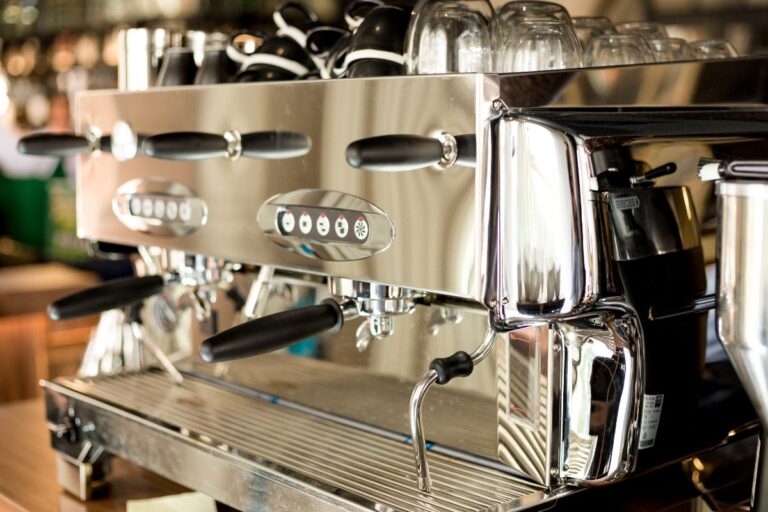How to choose a commercial coffee machine?
This choice can make or break your coffee shop. A coffee machine is the central piece of your coffee shop, and usually the most expensive part.
Also, it will be the main source of your income.
By Jozo Salmanić – Croatian barista with 15 years of experience.
Affiliate disclosure
This page may contain affiliate links – we may earn a small commission when you make a purchase through these links. This is at no extra cost to you.
The best way to choose your commercial coffee machine is to talk to a professional who can explain everything you didn’t know about these magnificent machines.
The worst thing would be to go and buy an expensive professional-looking coffee maker without any previous knowledge.
How To Choose A Commercial Coffee Machine – Learn The Lingo
The coffee jargon can sound confusing.
Here is a quick overview of every term you should know to pick a commercial coffee machine.
Boiler
The boiler heats the water for making coffee and steaming milk.
A larger boiler means your machine will have more warm water and thus can produce more drinks.
It also means a larger utility bill.
Dual-boiler machines have two boilers – one for making coffee, the other for steaming milk.
Gravimetric
Gravimetric machines measure the amount of coffee using a built-in scale.
They “use beverage mass to deliver consistent and controllable results” – says James Hoffmann for the World Coffee Portal.
Grinder
A device that grinds the coffee beans so your coffee maker can extract them using hot water.
A solid grinder is as important as your coffee maker.
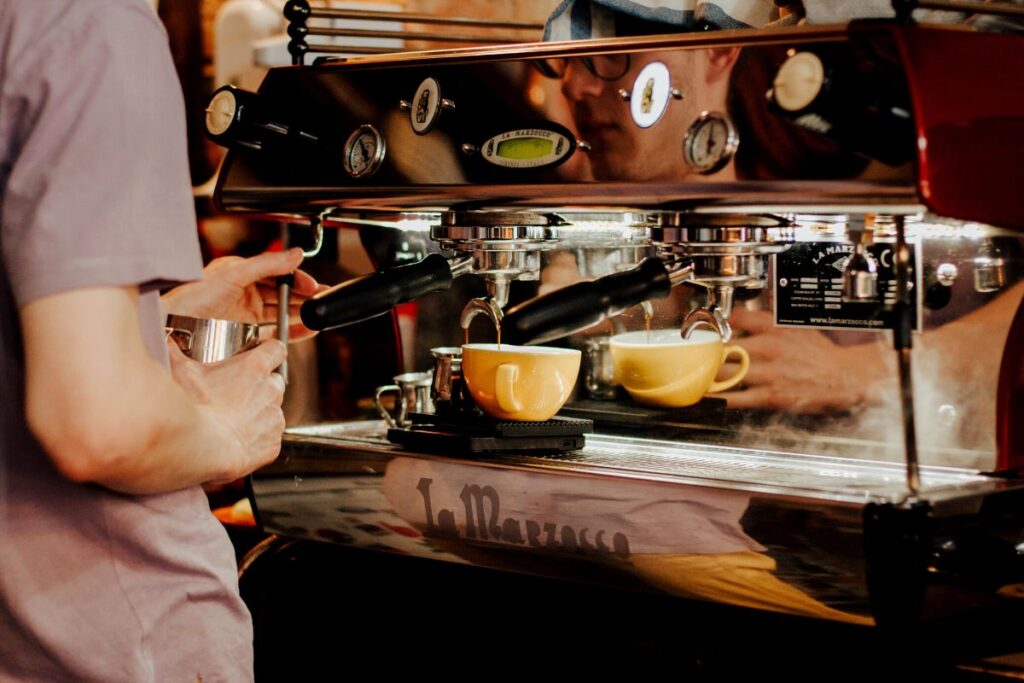
Group Head
A group head also known as a brew head or shower head.
It’s the place where hot water comes out from the machine to the filter basket and extracts the ground beans.
Depending on type and size, you will see espresso makers with 1, 2, 3, or even four group heads.
PID Controller
PID is short for Proportional-Integral-Derivative.
It sounds complicated, but it’s a small electronic device that keeps the water inside the boiler at a set temperature.
You can install PID in most commercial espresso makers.
Of course, some models already have it.
If you want to make a hobby out of modernizing your old espresso makers with PID, check out this article and video guide from Hackaday.
Portafilter
A portafilter is also known as a group handle.
This Majesty Coffee article teaches us that “This spoon-looking device harbors a basket which is actually what holds the coffee grounds during the pulling or extracting of the espresso shot.”
Well said.
Steam Wand
Surprisingly, it’s a wand that steams milk for lattes, cappuccinos, and other beverages.
Its position is on the left/right of the group heads.
Professional espresso machines with three and more groups usually have two steam wands.
Tamper
Tamper is the thingy barista uses to press and evenly spread ground coffee in the portafilter basket.
You take the tamper in your hand and “just press until the tamper isn’t going any further” – teaches us Noah Nighswonger, an NYC full-time barista.
What Type Of Premise Are You Running?
The type of premise you are running determines the type, size, and price of the desired commercial espresso machine you will need.
Not So Coffee-Centric
If the sole purpose of your premise is not to sell coffee, then you don’t need a high-priced coffee maker.
For instance, bookstores, small diners, and fast foods can use a drip coffee maker or a small home-line espresso maker.
There is no need to go big.
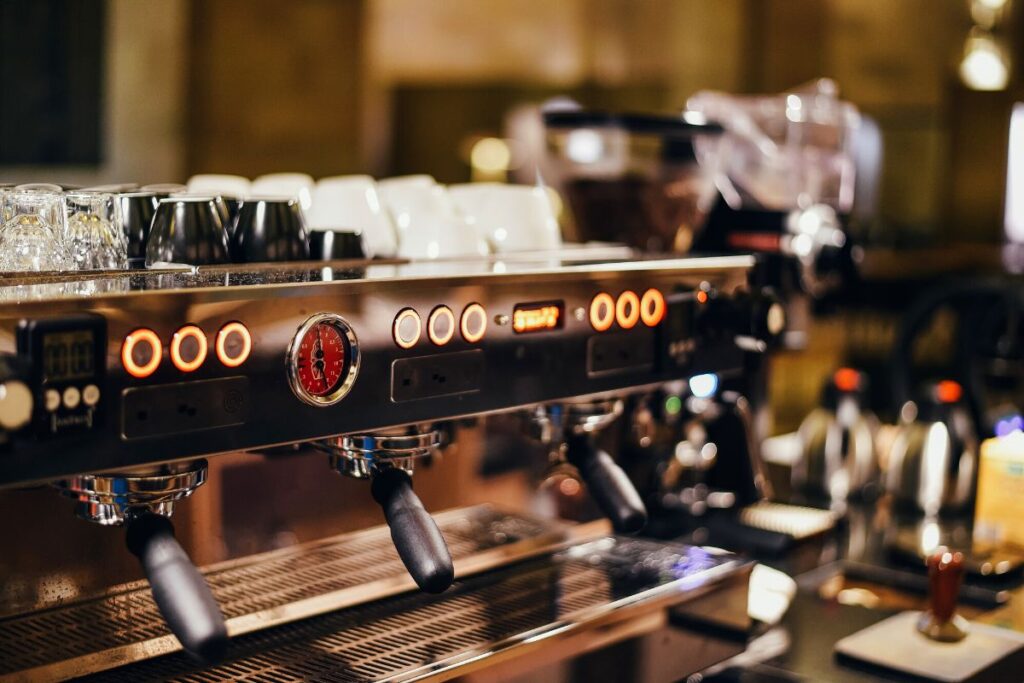
Coffee Is A Significant Part Of The Income
If you have a small cafe or a restaurant, a nice piece of your income comes from selling coffee.
According to your guest profile and the number of cups you make, you can choose between semi-automatic and fully automatic coffee makers.
If coffee makes 40% or more of your daily sales, you should get a commercial espresso machine.
If your customers just occasionally drink coffee, a small, fully-automatic coffee maker will be enough.
However, if you want to raise the quality of your service, semi-automatic coffee machines are always a better choice.
Coffee-Centric Premise
The Cambridge Dictionary defines a coffee shop as “a small, informal restaurant where drinks and small meals are served, sometimes in a larger shop or building.”
Hence, coffee is in the first place, and soft drinks and tea are in second place.
If you run a coffee shop, then there is no doubt you need a semi-automatic coffee maker.
Coffee is your main product, and it gets you the most money.
You will need a reliable and durable machine, capable of brewing a lot of coffee the whole day.
How To Choose A Commercial Espresso Machine By Configuration
All espresso machines, from home ones to big chain behemoths, fall under one of three categories:
- manual
- semi-automatic
- and fully automatic
Manual Or Lever Espresso Makers
Manual espresso makers are relics of the past.
These machines are a sight for sore eyes and will give a dash of elegance to your coffee shop.
By pulling the lever, you manually create enough pressure to make an espresso.
These machines, although beautiful, are impractical for a busy cafe, as they are just too slow for modern requirements.
However, they are good if you want to impress your business partners or put them in the corner of your coffee shop and rarely use them.
Semi-Automatic Coffee Machines
These coffee machines do a lot by themselves.
However, well-trained baristas are needed to produce uniform and great-tasting coffee.
Most coffee shops use semi-automatic espresso makers.
These machines are the canvas for highly-skilled baristas to make masterpieces.
From adjusting the dosage of coffee to making instagramable latte art – these machines make it all happen.
Fully Automatic Espresso Machines
Fully automatic espresso makers are also called bean-to-cup machines.
You can usually find them in airports, offices, gas stations, or premises where coffee is not the primary or relevant source of income.
These machines often come with modern displays and a bunch of options to choose from.
You have to click on the beverage you want, and the machine will do the rest.
The main focus here is speed.
However, you can’t adjust any part of the coffee-making process.
Real coffee aficionados are often unsatisfied with the taste.
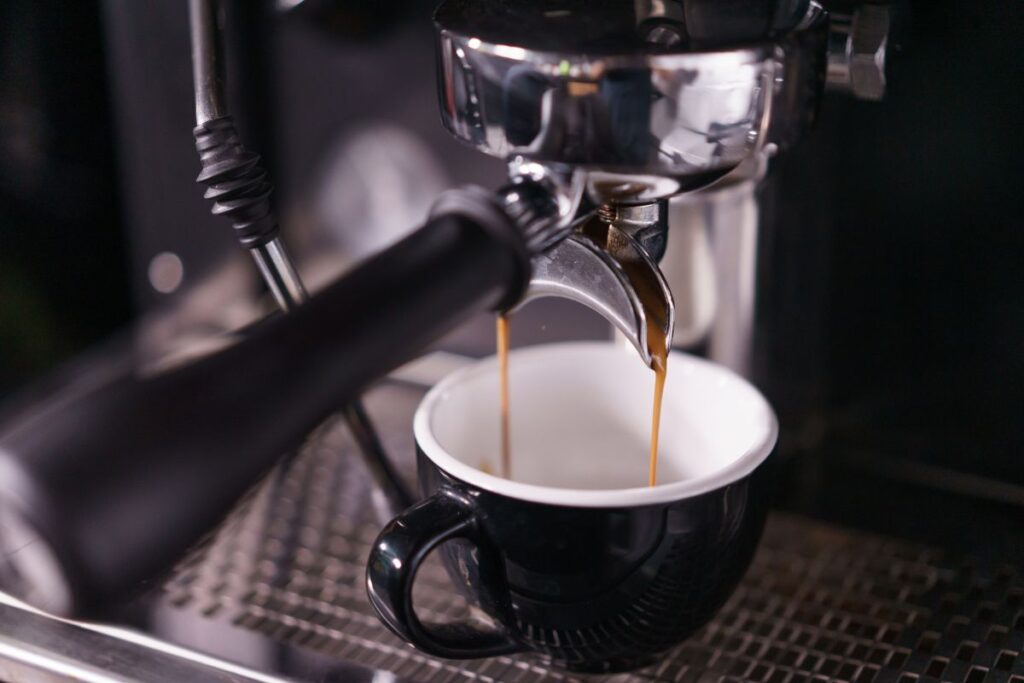
3 Main Features Of A Coffee Machine For A Cafe
Buying a commercial coffee maker means you are an entrepreneur now.
You need to pick your cards carefully when investing.
Your Coffee Maker Must Be Reliable
Any downtime of your coffee machine means you are losing money.
To prevent that from happening, you must:
- A) maintain your money-making machine
- B) choose the best model
Buy from renowned manufacturers, maintain your machine well, and always have the phone number of the maintenance department on speed dial.
It Has To Produce Consistent Coffee Every Time
Of course, I mean the coffee must be consistently GOOD all day, every day.
The first espresso must taste the same as the 101st that day.
Besides a great barista, you also need a state-of-the-art machine to achieve that consistency.
A quote from La Marzocco’s blog: “When we step up to the espresso station, whether it’s at a cafe or on our kitchen counter, we are the variable.”
It hurts to hear that, but it’s the truth.
A Flawless Design Is A Must
The coffee machine is the central part of your coffee shop.
It’s the thing all customers set their eyes on while ordering and waiting for their cup of Joe.
Functionality is still far more critical, but a sleek design will help to attract more customers.
“When you choose an espresso machine, you are choosing a piece of design” – say the designers from the Ponte Vecchio.
A well-designed machine paired with a knowledgeable barista who can answer all the questions about that machine is a winning combination.
2-Group Vs. 3-Group Espresso Machine – Which One?
Before buying, ask yourself: Do you need the 3-group espresso machine?
Bigger isn’t always better.
An espresso maker with two groups and one steam wand is usually more than enough for smaller coffee shops.
If you are just starting, it’s better to save that price difference and invest it into a professional grinder or barista training.
2-Group And 3-Group Coffee Machines: The Difference
Compared to the 2-group espresso machine, the one with three groups is:
- wider – space issue
- a lot heavier – counter issue
- needs more power – electricity issue
- needs more maintenance
- costs more
If you don’t have enough space or power, a 3-group espresso machine won’t miraculously upscale your business.
If you make around 50 cups of coffee every day, you don’t need a machine with three groups.
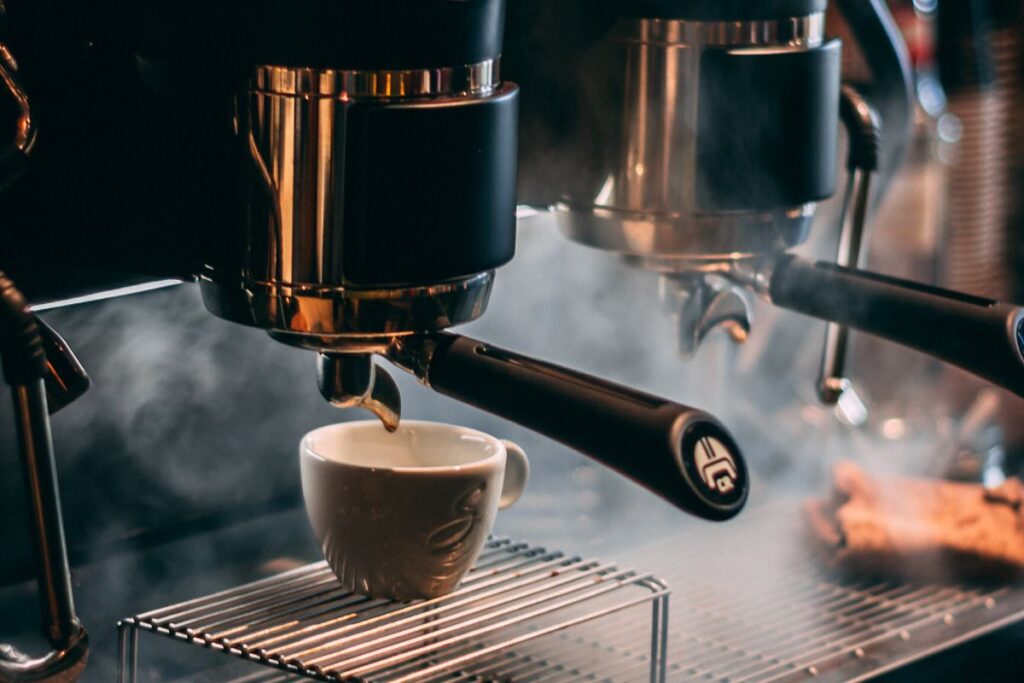
Benefits Of The Three-Group Espresso Machine
If you have enough customers, or you simply want to have a larger machine, by all means, buy the big one.
It will have its benefits:
- two baristas can work simultaneously
- you have two steam wands
- you can save one head for specialty coffee
- if one head dies in the peak of the rush, you’ll have other two
From my experience, two baristas simultaneously pulling shots and making latte usually don’t work that well.
But if you set one to make coffee, and the other to froth milk and do latte art, you can unleash the full potential of a 3-group espresso maker.
Don’t forget: This applies only if you have enough space.
Overcrowding your counter and leaving zero working space for baristas usually has the opposite effect.
Renting A Commercial Coffee Machine For A Small Cafe
Buying a commercial coffee machine can be a huge investment, especially for new coffee shop owners.
The Biznovice experts have estimated that “The cost of basic coffee equipment needed to make coffee drinks will cost you around $20,000-$40 000.”
In my experience, it’s always better to buy the machine, but not everyone can afford it at the start.
Renting a machine also has good sides.
It Can Be A Package Solution
Most companies that rent coffee shop equipment will offer you a package solution.
It will include cups, plates, and a professional coffee grinder.
Perhaps they will throw in a few pounds of beans, to start with.
A good grinder is equally important as a coffee maker.
A professional grinder is also not on the cheap side, so these kinds of package deals are a good way to start.
It Saves You Money In The Short Run
Sure, renting will cost you much more in the long run, but you are just starting your coffee empire.
The inventory, staff training, and utilities… all costs hefty sums of money.
Renting a professional coffee machine is like a mobile plan – you pay in monthly installments.
If your coffee business grows, it’s easy to buy the machine.
If it doesn’t, renting will save you a lot of money.
You Can Try The Machine Without Actually Buying It
Perhaps you are still unsure what commercial espresso maker would best suit your coffee shop.
In that case, it would be silly to spend over $20K on a 3-group Italian stainless steel demigod machine and end up brewing just 10 cups a day.
Rent the machine, and start with a smaller model.
Any renting company will let you upscale the rent agreement.
You Will Have Less Issues With Maintenance
When buying a coffee maker, you get a warranty from a manufacturer.
That’s usually a couple of years. But what later?
If the dealership is nowhere close when your coffee machine malfunctions, you must close the shop for a day or a week.
When renting, the renter usually has a dedicated team for maintenance and repairs.
More importantly, if your machine breaks, you will get a substitute one, so you don’t lose even a cent that day.
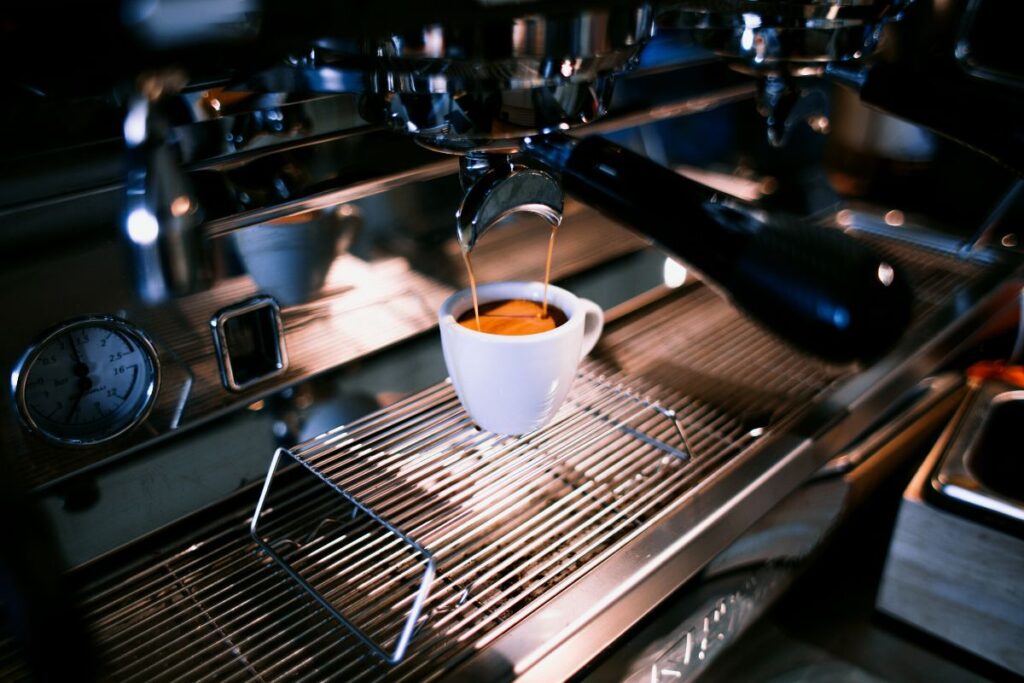
Are Used Commercial Coffee Machines A Good Choice?
When buying a used commercial machine, you plan to save some bucks.
However, if you are new in that area, it might quickly turn out to be the worst investment ever.
But every coin has two sides.
Used espresso makers can have an irresistibly low price. Look for refurbished or reconditioned ones.
Those machines are thoroughly checked, all faulty parts are replaced, and they function as they should.
Craigslist, eBay, Facebook Marketplace – I’d pass.
I bought some of my home coffee equipment there, but nothing that important (or expensive).
You definitely don’t want to spend a few thousand $$ on a used commercial machine, carry it home and find out that the repairs cost double the price.
Renting is the better option if you ask me.
However, if you want to buy a used machine:
- buy it from reputable sellers
- choose respectable models
- ask for a warranty + the service if anything goes wrong.
In any case, start saving for a new espresso machine.
How Much Can The Best Commercial Espresso Machine For A Small Coffee Shop Last?
Your machine should last you anywhere between two and 15 years.
You can increase the lifespan of your machine if you buy a good model and maintain it every day.
Buying from a reputable seller is a must here.
No cutting corners.
The actual lifespan of your coffee maker will depend on how many cups you make every day, is your machine is made from metal or plastic, and how well you treat it.
If you do try to use a home-line machine for a heavy workload, it will give you under-average coffee, and it will presumably break in less than a year.
I’ve seen newbie bar owners try that, too.
Untrained staff and low-skill maintenance shorten the lifespan of espresso machines.
The Final Drop
Choosing a commercial espresso machine can be a stressful process.
After all, you are buying the heart of your coffee business.
But you are the brain, don’t forget that.
Pick well, and you will have a machine that will serve you for a decade or two.
Photos by Odua Images, Denis Zagorodniuc, Marta Dzedyshko, Sander Dalhuisen, Burst and Pexels

